|
July, 2005
Aug. 2005
Sept. 2005
Oct. 2005
Nov. 2005
Dec. 2005
Jan. 2006
Feb. 2006
Mar. 2006
Apr. 2006
May 2006
June 2006
July 2006
August 2006
September 2006
October 2006
November 2006
December 2006
January 2007
February 2007
March 2007
April 2007
May 2007
June 2007
July 2007
August 2007
September 2007
October 2007
November 2007
December 2007
February 2008
March 2008
April 2008
May 2008
June 2008
July 2008
August 2008
September 2008
October 2008
November 2008
December 2008
February 2009
March 2009
April 2009
May 2009
July 2009
August 2009
September 2009
November 2009
December 2009
January 2010
February 2010
March 2010
April 2010
May 2010
June 2010
July 2010
September 2010
October 2010
November 2010
December 2010
January 2011
February 2011
March 2011
April 2011
May 2011
June 2011
July 2011
September 2011
October 2011
December 2011
February 2012
April 2012
June 2012
July 2012
August 2012
October 2012
November 2012
February 2013
May 2013
July 2013
August 2013
October 2013
November 2013
ČERVENÁ BARVA PRESS NEWSLETTER
Gloria Mindock, Editor Issue No. 85 April, 2014
INDEX
Welcome to the April, 2014 Newsletter
This month, Červená Barva Press celebrates 9 years!!!! Wow! We are very excited about this.
I hope you will come join us in a celebration of our anniversary on Tuesday, April 8th at 7:00PM
at the Arts for the Armory, 191 Highland Avenue, Somerville, MA. We will be in the Červená Barva Press studio, B8.
Červená Barva Press was founded in April, 2005 and since 2006, we have published approximately 128 books.
Most all our books can be found in our studio besides online at our bookstore, The Lost Bookshelf.
Recent books are on the Small Press Distribution site.
Thanks everyone for making the press so successful and for supporting us and helping Bill and I
bring books out into the world. We are grateful to our authors, interns, friends, community,
Arts at the Armory, Bagel Bards, our International friends, and the list goes on…. Thanks to
those with us from the beginning and to all those published on the 21 postcards- the first
thing the press solicited and published.
Červená Barva Press would like to welcome Flavia Cosma as our International Editor. I am so excited
in having Flavia be a part of the press. Thank you Flavia!
Mikail Jaikaran is our intern who has been working with us since December. He has done so much with
helping the press. Bill and I are so grateful for all his work.
We have been in our studio now for a little over a year. Irene Koronas has helped me with the reading
series, workshops in the space and much more. She is my co-host for the series.
Thanks a zillion Irene for everything and being such a big help and for the laughs!!!
In the studio, I plan on making a list and hanging it on the wall of those that have helped
the press and the studio make a go of it. There has always been such kindness towards the press
by so many, so thank you!!! If I were to list names here, you would be reading them for pages.
It is easier to put on the wall. This way, I don't forget anyone.
There will be more changes with the press as the year goes on. The changes will be announced
in the newsletters and on FB. The press has grown so much, sometimes it is difficult to keep up.
I hope to bring in more people to be involved in time.
There are three interviews in the newsletter this month.
I hope you enjoy them. Interviewed are: Joanna Kurowska,
David Gullette, and Claudia Serea
In March, we published 5 new full-length books and one chapbook.
We are very excited about this! The books are:
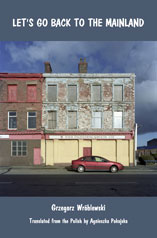
Let's Go Back To The Mainland by Grzegorz Wróblewski
Grzegorz Wróblewski, born in 1962 in Gdansk and raised in Warsaw, has been living in
Copenhagen since 1985. He has published ten volumes of poetry and three collections
of short prose pieces in Poland; three books of poetry, a book of poetic prose and
an experimental novel (translations) in Denmark; and a book of selected poems in Bosnia-Herzegovina,
as well as a selection of plays. His work has been translated into fifteen languages.
His recent book of prose poems, Kopenhaga, was published by Zephyr Press, 2013.
Between classical lyricism and central European surrealism, between the punk aesthetic
of Mark E Smith and the existentialism of Camus, between the miniatures of Joseph Cornell
and the stalker of Tarkovsky, between painting, plays, poetry, performance art, and the
memoir, between Poland and Denmark and the milky way, Grzegorz Wróblewski is on the mainland.
His work is the most distinct and diverse coming out out of the so-called "bruLion generation"
always moving into the major leagues of this universe and perhaps others. If we don't become
extinct as a species in the near future, Wroblewski will go down as one of our greatest writers, artists, and thinkers.
-Marcus Slease, author of Mu (so) Dream (window)
Cover photo: Wojciech Wilczyk
$17.00 | ISBN: 978-0-9910091-7-6 | 85 pages
Order Let's Go Back To The Mainland here...
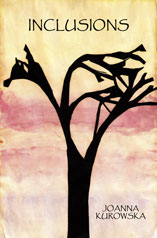
Inclusions by Joanna Kurowska
Joanna Kurowska immigrated to the U.S. in 1988. After publishing two books of poetry in Poland-Ściana
(The Wall), 1997 and Obok (Near), 1999-she gradually switched to English as her poetic medium. Many of her
poems have appeared in American and European journals. In 2013, eLectio Publishing released The Wall & Beyond,
a volume of her Polish poems translated into English. Another collection of Joanna's poetry,
The Butterfly's Choice, is forthcoming in 2015, from Broadstone Books.
Inclusions is Joanna Kurowska's first book of originally English-language poems.
These mostly short, lapidary lyrics present to the reader not only a fallen world of detritus, missed emotional
connections, thoughtless consumption, empty gratification, but also a world of fragile and fleeting beauty, raptures
that last "but a fraction of a second," and art-making that redeems us. A town's soul leaks away as globalization
grinds everyone and everything to sameness; a bishop's suit in a window is "a skin missing a body;" and a price is
put on everything: "The trees have turned into business letters." This is simply the "now," as Kurowska sees it.
But these are spiritual poems, though the god evoked-invoked-is not the property of any single group or mission.
In the title poem, the speaker longs "to make sure/that i, too, am included/in the world deposited/on God's tongue."
And always, the human possibilities, and the beauty of the world, are what we transcend to. In the final
poem, to her son who asks what the meaning of life is, the poet replies, "Next to me, a feather swirls/In the air.
A draft carries it/When the window is open" … To me, this is a lovely, non-Western image of the inclusion the
poet prays for.
—James Cummins, Author of Still Some Cake
Inclusions is a book of surprising, reflective encounters with things as small as ants and as big as God.
The ants, however, are big enough to make us think
about the meaning of life and death. God, on the other hand, is small and light enough to fit into a snowflake.
The poems listen to silence, loved ones now gone, cupboards and birds. Joanna Kurowska's slender verses pray by
playing and masterfully lead the reader to the realization that "knowing is letting go."
—Katia Mitova, Author of Dream Diary
Cover Art: Untitled (1991) by Paweł Młynarczyk
$17.00 | ISBN: 978-09910091-6-9 | 53 Pages
Order Inclusions here...
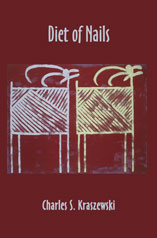
Diet of Nails by Charles S. Kraszewski
Charles S. Kraszewski. Poet and translator. Recipient of the 2013 Award for the Promulgation of
Polish Literature and Culture by the Union of Polish Writers Abroad (London). Recent publications
include Beast (poems), Rossetti's Armadillo (verse translations and essays),
Irresolute Heresiarch: Catholicism, Gnosticism and Paganism in the Poetry of Czeslaw Milosz.
Creative in both English and Polish, he is a frequent contributor to
Odra (translations of T.S. Eliot and Robinson Jeffers).
Cover art: Navajo Antelopes by Stefan Tejk
$17.00 | ISBN: 978-0-9910091-5-2 | 87 Pages
Order Diet of Nails here...
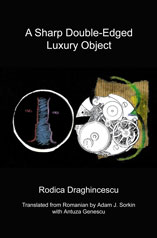
A Sharp Double-Edged Luxury Object
by Rodica Draghincescu
Translated from Romanian by Adam J. Sorkin with Antuza Genescu
Rodica Draghincescu, born in 1962 in Buziaş, a town in the
province of Timiş in the west of Romania, and now living in the
region of Metz in France, was called by World Literature Today
"one of the most spectacular figures in the new Romanian
literature of the 1990s." She has published prize-winning books
of original poetry and prose fiction in Romanian and in French
(both in France and Canada), as well as translations, interviews,
and essays. Her work has also appeared in translation in England,
Belgium, Italy, Spain, Sweden, Switzerland, and the United States.
In 2006 Draghincescu was awarded the "Le Lien" Prize for Poetry
in Nancy-Metz, France, and in 2013 the "Virgil" Prize for
European poetry in Paris. Since 2007 she has served as Artistic
Director of the International Poetry Festival of Metz and consultant for arts education to
the institutions of culture of Lorraine, and she is editor-in-chief of the multilingual
web-magazine Levure littéraire and on the editorial board of the German review Matrix.
About the Translators:
Adam J. Sorkin is a translator of contemporary Romanian literature, whose work has won
the Poetry Society (U.K.) Corneliu M. Popescu Prize for European Poetry Translation for
2005, as well as the Kenneth Rexroth Memorial Translation Prize and the Ioan Flora Prize
for Poetry Translation. In 2011, he published A Path to the Sea by Liliana Ursu, translated
with Ursu and Tess Gallagher (Pleasure Boat Studios—Silver Award winner in poetry as a
ForeWord Reviews Book of the Year), Ioan Flora’s Medea and Her War Machines,
translated with Alina Cârâc (University of New Orleans Press—third-round selection for
the National Translation Award), Ion Mureşan’s The Book of Winter and Other Poems,
translated with Lidia Vianu (University of Plymouth Press), and The Vanishing Point That
Whistles: An Anthology of Contemporary Romanian Poetry (Talisman House). In 2012,
Mouths Dry with Hatred by Dan Sociu, translated with the author (Longleaf Press), and
The Flying Head by Ioan Flora, translated with Elena Bortă (Toad Press), both appeared.
Sorkin is Distinguished Professor of English at Penn State Brandywine.
Antuza Genescu is a free-lance translator who lives and works in Timişoara in the west of
Romania. Her translations of Rodica Draghincescu with Adam J. Sorkin have appeared in
literary publications in the United States, the Netherlands, and Slovenia, both in print and
on the web.
Cover Art: Devis Grebu
$17.00 | ISBN: 978-0-9910091-2-1 | 41 Pages
Order A Sharp Double-Edged Luxury Object here...
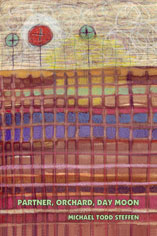
Partner, Orchard, Day Moon by Michael Todd Steffen
Michael Todd Steffen’s poems and articles have appeared in Connecticut Review,
Poem (HLA), ACM (Another Chicago Magazine), Ibbetson Street, Wilderness
House Literary Review, Muddy River Poetry Review and in the window of the
Grolier Poetry Bookshop. A graduate of Belmont in Nashville, on a Rotary
International Fellowship he studied and taught in England and France. He was
awarded the 2007 Somerville Newswriters Festival poetry prize, and currently
lives in Cambridge where he writes and works for non-profits.
I've just come back from reading the poems in Partner, Orchard, Day Moon,
full of admiration. Steffen is so alive in his writing, keen with observation, both
of what things actually look like, what the wind feels like, how things grow and
rot, and also of character, his own, his uncles', anybody's he sees. The book
gives us many wonderfully memorable lines using his chosen meter for all its
worth. This is very good work.
—David Ferry
Cover Art: Irene Koronas
$17.00 | ISBN: 978-0-9883713-2-3 | 61 Pages
Order Partner, Orchard, Day Moon here...
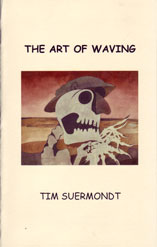
The Art of Waving by Tim Suermondt
Tim Suermondt is the author of two full-length collections: TRYING TO HELP THE ELEPHANT MAN DANCE
(The Backwaters Press, 2007) and JUST BEAUTIFUL from New York Quarterly Books, 2010. He has published poems
in Poetry, The Georgia Review, Blackbird, Able Muse, Prairie Schooner, PANK,
Bellevue Literary Review and Stand Magazine (U.K.) and has poems forthcoming in Gargoyle,
A Narrow Fellow and Plume Poetry Journal among others. After many years in Queens and
Brooklyn, he has moved to Cambridge with his wife, the poet Pui Ying Wong.
"Tim Suermondt's poems in this new collection are open, friendly and inviting, in "the voice of our familiarity,"
but always with a profound or humorous twist. He is devoted
"to a bravery found only in the details," to the "the raspberries and the ball games,"
or his wife "in a strange and beautiful hat," as well as to the dreams, disappointments
and possibilities of everyday existence. Not for him the modish pessimism and linguistic
difficulties of much of contemporary poetry. "When my wife puts on some Schubert," he says,
"I'm sure the world will never end/ and neither will we." Here is a poet who communicates
directly and has some hope for us. The apparent simplicity and genial humor of these marvelous
poems are grounded in an artful subtlety that reflects the way life really is."
—Norman Stock
Cover Art: "Skull in a Landscape" (1946) by Edward Burra
$7.00 | 28 Pages | In Stock
Order The Art of Waving here...
Červená Barva Press Reading Series for April, 2014
All readings/events held in the Červená Barva Press Studio, B8 (Basement)
Arts at the Armory
191 Highland Avenue
Somerville, MA
7:00PM
Cover: $3.00
April 3rd
Readers: Kathleen Aponick and Martha Carlson-Bradley
April 8th
Červená Barva Press 9 Year Anniversary Celebration
No cover charge
April 16th
Thaddeus Rutkowski and Chad Parenteau
April 17th
Marguerite G. Bouvard, Kim Triedman,
Joanne DeSimone Reynolds
April 23rd
Rusty Barnes, TBA
April 24th
Susan Nissenbaum-Becker and Gary Whited
April 28th/Special Event
Peter Daniels with Q & A to follow
April 29th
Susan Lewis (book launch), Gloria Mindock and Sam Witt

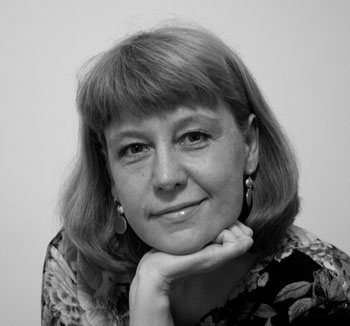
Joanna Kurowska immigrated to the U.S. in 1988. After publishing two books of poetry—Sciana (The Wall), 1997 and Obok
(Near), 1999—in Poland, she began to write poetry in English. Many of her poems appeared in American and European
journals. In 2012, she published, with eLectio Publishing, The Wall & Beyond—a collection of her Polish poems
translated into English. Her two other books, Inclusions and The Butterfly’s Choice, are under contract.
A published scholar with expertise in Joseph Conrad, Joanna holds a Ph.D. from the University of Illinois
at Chicago and is the recipient of the Bruce Harkness Young Conrad Scholar Award. She has taught at several
American universities, including Indiana University, Bloomington, and University of Chicago. She lives
in Evanston, Illinois, together with her partner John Brownell, son Pawel Mlynarczyk, and cat Rufus.
When did you leave Poland and immigrate to the USA?
I left in December 1988, about twenty-five years ago. Poland was still in the aftermath of marshal law,
general Jaruzelski was in power. I used to describe to my American students what life was like in Poland
during the 1980s. As a young mother, I would push a stroller—my baby son sleeping in it—from home to a
grocery store, where I would stand in a queue for some forty minutes to get basic food supplies (whatever was
available). Then, shopping bags in both hands, still pushing the stroller, I would go to buy meat. The lines
for meat were long, the wait time could take more than two hours. People in the queue were irritable. Meat was
rationed, everyone had a government coupon, divided into little squares, like post stamps. Each square represented
the amount and kind of meat you were allowed to buy: beef 1 kg, pork w/bone 40 dkg, sausage ½ kg... When your turn
finally came, the sales person, usually a woman in a white apron would tear off those little squares,
until you exhausted your monthly allowance.
Then, off I’d go to get produce—more shopping bags to carry: potatoes, carrots, apples… The stroller—the only
one I was lucky enough to get—did not have any bottom tray to put things on, so I carried everything in hands...
Moreover, if I saw a line of people standing in front of a department store on my way home, I would join them in
order to buy toilet tissue, which was always in short supply in the communist Poland. Toilet paper was sold ten
rolls on a string; one string per person. Both my hands being amply occupied, the only choice I had was to hang
the string with the toilet tissue on my neck, like a necklace. Then I would push the stroller back home, to cook
dinner!
Such were the times—but we, the Poles, knew how to laugh at that Soviet-imported grotesque, even with all its menace
against human rights (which my family, being repeatedly harassed by the secret police, knew all too well). People
developed an amazing community-support system… No, not a "system." It was spontaneous. Empty stores and all,
somehow we always had what we needed. This is how it worked, if you had an extra package of coffee, you would
give it to someone else. The next thing you knew, just when you ran out of, say, laundry soap, a friend would
stop by with a box of detergent, saying, "Have some extras; do you need it?" I recall those moments of human
solidarity when our modern society is so horribly divided, atomized.
There's a little bit of irony in that I was invited to America just before the great political changes in
Central Europe and the collapse of the Berlin Wall. Soon after I came to America, “America” came to Poland,
so to speak. But especially my parents were full of hopes for me and my son, then seven-year old. They thought
we would have better prospects in the USA. So off we went, Paul and I, with two suitcases, a backpack, a guitar,
four hundred words in English (learned within a month before our departure), and forty dollars—to start our new
life with.
When did you start writing? In English? What were the challenges you faced?
I published my first poem when I was seventeen. Then, already a university student in Poland, I would occasionally
write a poem on some scrap of paper. I always wanted to write but had little faith in myself. However, if a topic
fascinated me, I would pursue it. For example, I wrote an essay on Edith Stein, the German philosopher who became a
Catholic nun. She was then murdered by the Nazis in Auschwitz. She was Jewish. In the mid 1980s, I faced a lot of challenges,
but I said to myself, "I'll finish the paper, no matter what." The essay was published, first in Poland, then in France.
It was a tiny victory, but the recollection of my perseverance over that paper sustained me in pursuing other goals,
later in life, while facing other challenges. After I came to the US, the most immediate challenge was of course the
lack of language. It was torture not to be able to talk with other people, engage in peer discussions, exchange ideas—all
of which were extremely important aspects of my life back in Poland. Maybe that triggered my early attempts at translating
my poems. As I was learning English, I transcribed my writing into the new language. Needless to say, those translations
were awkward. But friends would offer me their advice. Eventually, I collected those poems in a book,
The Wall & Beyond. Language-wise, it had taken over twenty years to get to that point. Working on my doctoral
thesis triggered the language transition. My topic was Joseph Conrad, a Pole who became England's celebrated novelist,
so I immersed myself deep in English, both literature and theory. My wonderful doctoral advisor, Dr. Donald Marshall
was of great help in my development as a scholar and writer. But as I reflect on this, everything that I have experienced,
including some challenging situations or negative people, has helped me get deeper into writing, so I’m grateful
to all.
You live in the Chicago area. Is this where you first settled in the USA? Why Chicago?
Someone invited Paul and me to come to Chicago. Paul went to school, I soon followed his footsteps—of course, the
American way, that is, studying and working three jobs at the same time. We did not have time or resources to consider
other options. Recently, my partner and I have begun to consider where we would want to live. We contemplate Wisconsin,
where we have spent our vacations for the last four years. Certain parts of Wisconsin remind me of my native Warmia and
Mazury—the beautiful, hilly and wooded land of my childhood and youth in Poland. Another option may be some warmer climate...
I really look forward to more opportunities to explore America’s natural and cultural treasures. Time will show!
Talk about your first two books published in Poland, Obok and Sciana.
Sciana is Polish for "Wall." It’s a poetry collection published in 1997, about nine years after I immigrated to the US.
The poems tackle such themes as my childhood and youth in Poland, emigration, reflections on various aspects of life. A
distinct theme is my wrestling with the Catholic Church, which I joined at the age of 24. I had met wonderful people in
the Church, both clergy and lay. Some of them became my dearest, life-long friends. But the Church as the institution
gradually became a problem, so a number of my poems reflect the tension between faith as an inward experience and religion
as an outward "system." In the middle of the 1990s, I met in Chicago the Polish poet Adriana Szymanska, who read my
poetry and very strongly encouraged me to publish it as a book. So I did. The title, Sciana, relates to the image or
symbol that I frequently use. The other volume, Obok (Near) was published two years later. It continues some of the themes
recurring in Sciana. I should mention that, in the 1990s, the prestigious Polish journal in Paris, Kultura, accepted some
of my poems for publication. That was a great boost. Kultura’s editor Jerzy Giedroyc and the Polish literary critic Leszek
Szaruga had helped me in finding a home for Obok. Although both books were written in Polish and published in Poland, most
of the poems came into being when I was already in America.
Discuss your new book, The Wall & Beyond.
Again, this volume is a selection of poems from either Sciana or Obok, translated by myself into English. After I
finished Inclusions (in 2010), which Červená Barva Press will publish this year, I returned to my Polish poems and
gradually collected them in the volume The Wall & Beyond. It was published by eLectio Publishing (Kindle edition 2012,
paperback 2013). The poems are arranged chronologically, from my youth in Poland, through immigration; followed by, again,
poems employing multiple meanings of the image of "the wall." The book received a number of favorable reviews, first on
Amazon, then in journals, notably Katia Mitova's review in Sarmatian Review. To my knowledge, forthcoming are reviews in
Penwood Review, Religion And The Arts, Slavic and East European Journal, and elsewhere. Readers have observed repeatedly
that The Wall & Beyond reads like an original English-language work, not a translation. I believe it's because I
discarded the old translations and simply re-wrote those poems in English. Friends, particularly my partner
John Brownell, had helped me tremendously in searching for the best English idiom.
Inclusions is forthcoming this year by Červená Barva Press. Please say a few words about this book.
Interestingly, my readings in Polish literature in translation have triggered a number of the
poems in Inclusions. Other poems reflect my experiences with America, my never-ending metaphysical
quest, poetic commentary on the contemporary world. A few poems tackle the demise of my father four years ago.
The volume has a very special significance to me because it is the first collection of my original
English-language poems. I should also mention, in 2009 my Polish-language poetry became subject of
critical inquiry by Andrzej Galowicz, a literary scholar in Poland, who published several
essays on Sciana and Obok. This also triggered my return to poetry. A
number of American literary journals opened their doors for my English-language poems. I am very grateful
to all of them. Particularly, I would like to mention Penwood Review and International Poetry Review,
the two excellent American journals that first accepted my work for publication. As a result, by the end
of 2010, I was able to collect my English language poems in a book. This is how Inclusions came into being.
Congratulations on The Butterfly's Choice being accepted for publication by Broadstone Books. Talk about this book.
While Inclusions contains originally English language poems, and The Wall & Beyond translations from Polish,
The Butterfly's Choice combines both; though most of the poems in the volume are originally English
language works. I would like to say a few words about the book's title. One day, on a parking lot in a village
in Wisconsin, my son Pawel spotted a butterfly caught between the lamp and its frame in a Harley motorcycle.
The poor creature was still alive but of course unable to fly. Seeing its suffering triggered my thinking about
the clash between nature and the human world. If caught in nature, by some bird for example, the butterfly would
just have been eaten. But the "Harley" butterfly remained half-alive (part of its body was burned from the
motorcycle's heat). So, in a poem, I bestowed on that insect the ability to reflect on its existential situation.
There are other poems about butterflies, in the collection. Another important topic is language, particularly
various relationships between idiom and place. The Butterfly's Choice is scheduled to appear in print in 2015,
from Broadstone Books.
Where is your favorite place to write?
My recliner. Of course, there is a problem with writing at home, there are always distractions. So
I guess I would welcome a writers' retreat. Also, I love cafés but can't write in the American ones because
of the noisy music that is played in most of them. It's a distraction to me.
Who are some of your favorite writers and why?
There are many writers or books that I love but Joseph Conrad remains my all-time favorite. I have worked on
his fiction as a scholar but want to use this opportunity to comment on him from my perspective as a poet.
In the Preface to his short novel The Nigger of the "Narcissus," Conrad sees his artistic task as
"to make you hear, to make you feel … before all, to make you see!" This statement has been subject to
many critical interpretations, particularly in the context of Conrad's connections with impressionism.
From my poet's perspective, this statement is mystical, made by a free-spirited, non-dogmatic person,
who wonders at the world as it offers itself to his view. Elsewhere Conrad says that the aim of creation
is "purely spectacular: a spectacle for awe, love, adoration, or hate, if you like…" I feel that is why
I write—because I look at the world in awe and try depicting what I see. If I can make someone else wonder
and ponder—in other words, if I can make anyone else see—then I'm happy! The other writers I
love—William Blake, Cyprian Norwid, Boleslaw Lesmian, Marcel Proust, Charles Bukowski, Tennessee Williams,
Anna Kamienska, Tymoteusz Karpowicz, to name only a few—they all make me see!
What are you working on now?
I'd like to mention two poetry collections. The first, just finished, is titled Columbus Comes To America. It focuses
on the U.S., as seen by an immigrant. Today's America seems very different from the country I landed in twenty-five years
ago. Of course, my perspective has changed as well. Columbus—the heroine of my collection—is not the 15th century
Portuguese traveler, but a modern-day woman, who sometimes is "in," sometimes "out," other times in-and-out at the
same time. I am currently looking for a potential publisher for this collection.
The other project, titled The Green Line, is a reflection on history based on the experiences
of my family during the second world war. While my grandfather, an officer of Polish Home Army, was imprisoned
in a Nazi Oflag (a POW camp), my grandmother, together with her two sons and her stepmother, became captive
to Poland’s other aggressor and the Nazi collaborator until 1941, the Soviets. Along with hundreds of
thousands of other citizens of the pre-war Poland, they were put into cattle trains, and transported to
Kazakhstan. My father was seven years old at that time. The impact of those experiences on his and other people's
lives has been monumental. The Green Line is a poetic reflection on those events; and on the ripple effect
they have had throughout generations.
Any last comments?
When Červená Barva Press accepted Inclusions for publication as a book, it was such an important validation
of my poetic pursuits. I have enormous gratitude to you, Gloria Mindock, as Červená Barva's editor and publisher,
for the enthusiasm, with which you responded to my submission. I also want to use this opportunity to thank very much
my two other book publishers, Jesse Greever of eLectio Publishing and Larry W. Moore of Broadstone Books,
and their associates—all of whom so generously invested their time and resources into publishing my work. And
I remain most grateful to all my friends, who believed in me as a poet. Thank you all so much!

Hoping we can talk a bit about your latest book: the novel, Dreaming Nicaragua. Also, I'd like to touch on your venture into
publishing with your new independent house, Fenway Press.
I'm far enough down the interesting road of my life that in my 60s I wanted to write an odd, dazzling, challenging, quirky,
one-of-a-kind book that would pay tribute to Nicaragua, the country that has owned my soul for the past quarter century.
The book is atypical in the variety of the time frames, the wildly different narrative voices, the use of visual material,
and a mixing of English and Spanish which meant that agents and editors didn't know what to make of it, and it was repeatedly
rejected. I had already for years had the idea of starting a small publishing house, and since I spent most of my adult life
working at Simmons College, 300 The Fenway in Boston, I leapt into the wave of independent publishing by founding Fenway Press.
The first book the press published was AROUND THE COLLEGE by my colleague George Nitchie, and accomplished poet who had never
published a book. He was in his 90s and with a bit of hustle the book came out in time for us to celebrate his work before he
up and died. DREAMING NICARAGUA was next. It has been well reviewed and has sold well enough that I have been able to donate
a couple thousand bucks of proceeds from its sale to our project in Nicaragua
(www.newtonsanjuan.org). Next came a first book
of poems by my former student Ani Gjika, an immigrant (with her family) from Albania, who after Simmons taught English in
Thailand and then studied with Rosanna Warren, Louise Gluck, and Robert Pinsky in the MFA program at BU. Ani's book,
BREAD ON RUNNING WATERS, is a smashing debut for a poet with a deeply personal voice, one that draws on her Albanian childhood,
her time in Asia, the problems of marriage, with a disarming honesty. Finally, this year we brought out a family memoir by
Ann Berthoff about her cranky grandfather who got to the frontier just after the homesteading boom had ended: he was
TOO LATE FOR THE FRONTIER. What makes this a fascinating read is the triangulation between the cool detachment of the
author, the bitter rage of her Uncle Benton who was the main recipient of the old man's pig-headed irrationality and wrote
Berthoff a series of amazing letters that crystallize our understanding of this particularly American sort of crazy curmudgeon,
whose refusal of common sense rings rather familiar these days.
Let me tell you about the motto of Fenway Press: "Fair Trade for Authors." Like many writers, I'm appalled by how little
authors earn from their labors. Even an established writer may earn only a dollar or two from the sale of a $25 book.
For my part, as a comfortably retired professor with a pension, I don't need to squeeze money from my authors. So my
rule is, once we've sold enough books to pay the printer and other up-front expenses have been covered, the author
keeps 100% of all proceeds from sales. This happened to Ani Gjika during AWP in Boston last March when I was sitting
with her at the Fenway Press table: I totted up expenses and income, and as I realized her book had broken even a
couple of days earlier, I took out the FP checkbook and wrote her a check that helped her pay her rent. I believe
Fenway Press is unique in following this Fair Trade model, in which the path is smoothed for a direct
relationship between the consumer/reader who buys the book and the producer/author who wrote it
(and writers always need cash). Our joke is that we should get a bumper sticker that says: I WENT INTO
POETRY FOR THE MONEY-FENWAY PRESS.
The word history is a weighty one. And yours is most definitely a storied one.
No doubt every generation imagines its literary greats to be the best, but for you, that claim is wholly
different: Burroughs, Ginsberg, Kerouac, Lee, Salinger, and Updike (to name a few) - I mean, some of the
greatest Beatnik writers came into their own while you studied English at Harvard. What was that like?
In the summer between my sophomore and junior years in college, I took my great-grandfather's walking stick, a
backpack, and a couple of books-ON THE ROAD, LEAVES OF GRASS, and a collection of Hart Crane poems-and hitchhiked
west for the next three months. Way west. It was the '60s and hitchhiking was still fairly safe and mostly legal.
Kerouac and the Beats-especially Ginsberg--had certainly a powerful impact on our generation, especially if we were
"Sons of Walt" and identified with the "raw" (rather than "cooked") school of American poetry. But some of us were
also reading Robert Lowell and Richard Wilbur and Randall Jarrell, whose techniques tended to have more formalist
roots. Plus we had rock'n'roll and the folk-to-rock transition (Bob Dylan used to sing at a club on Mt. Auburn St.
in Cambridge) and always those two powerful RECORDED voices ringing in our ears, T.S. Eliot and Dylan Thomas-poetry
as spoken performance. So I'd have to say the influences on my own writing were all over the map. (Strangely, I
discovered my beloved older sister Emily Dickinson only in midlife.)
Now I'm not sure if this is a sore subject with you or not, but you're often credited (unofficially) as one of
the founding editors/writers of this little publication known as Ploughshares. You've certainly guest edited
(Issue #7, Spring 1975), and written a number of pieces for the now-famous literary magazine based out of Emerson
College. Would you mind telling us a bit about what it was like being on the ground floor of something of such
magnitude? At the time, do you remember thinking it would ever grow to be as big as it is now?
The literary founder of Ploughshares, DeWitt Henry was actually teaching part-time at Simmons when the magazine was
founded, with the help of money that Peter O'Malley somehow managed to withdraw from the till at the Plough and the Stars,
the famous Mass Ave bar that still exists. Early on, we had epic moderately boozy editorial lunches at my house that
went on for hours. The founding idea, to have a new guest editor for every issue was I believe a stroke of genius.
We wanted to avoid the cliquishness of so many magazines that only publish one identifiable kind of writing and develop
a predictable "sound." If I might correct you, the first and only volume I personally edited vas volume 2, number 3,
which carried poetry by a mix of established poets (Kenneth Rexroth, Richard Wilbur [Peter O'Malley's father-in-law],
Eamon Grennan, Anthony Hecht, Raymond Carver) and up-and-comers like Albert Goldbarth, Robert Pinsky, Lloyd Schwartz,
Ira Sadoff, Margo Lockwood and others. It also contained an excerpt I had translated from a book by Octavio Paz, who
was teaching at Harvard at the time and had become a friend. We also had a pair of poets-interviewing poets,
Norman Klein with Mark Strand, and George Starbuck with Charles Simic. It remains an immensely readable volume.
And Ploughshares has become a national treasure. Did I/did we ever imagine it could become so? I think we were too
busy getting issue after issue out to worry about such dreaminess.
My only real regret is that we asked Simmons to become the permanent home of Ploughshares and they short-sightedly
said no. So Simmons' loss has been Emerson's gain.
Your ongoing relationship with Nicaragua, particularly the small coastal town of San Juan Del Sur, has spawned a
number of side projects: from a photo-series done by local children of Cebadilla (In Their Eyes, 2005.), to the
San Juan Del Sur Biblioteca Movil, the country's first mobile lending library, to IDS 228, an interdisciplinary service
learning course based out of Simmons, to the Newton-San Juan del Sur Sister City Project you co-founded more than 25
years ago. Would you mind telling us how this all came about? Who were some of the major players in keeping this
relationship thriving?
First, to set the record straight, The Cebadilla photo project was the brainchild of my god-daughter Jessica Chermayeff,
and the Biblioteca Movil, was founded and is still run by the great Jane Mirandette, a friend of many years. I share no
glory from these efforts, but feel great admiration.
I could babble on for hours about Nicaragua, but the short version is this: in the 1980s Ronald Reagan decided that
the richest country in the history of the world should make war against the second poorest country in the hemisphere,
Nicaragua, led by the Sandinista Front, which had just tossed out the US-supported dictator Somoza and embark on what
might best be called a Christian Socialist Revolution. Regan secretly armed a mercenary army of terrorists called the
Contras (counter-revolutionaries that) committed certifiable atrocities. A lot of us on the left and in the
peace-and-justice movement, plus a fair number of mainstream religious folks, decided we should go to Nicaragua,
defend it with words, and show our solidarity-a funny, archaic-sounding word that really means "you're suffering
and I intend to stand by you."
Those who went to Nicaragua in those years were mocked in the press as "sandalistas," but in fact the
anti-contra movement grew and the Massachusetts delegation in the Congress was instrumental in outlawing
aid to the Contras, at least for a while. My first visit was in the mid-'80s with my friend Steve Chinlund,
who is an Episcopal priest. On that visit I had been reading a book of poems by newly literate peasants (yes,
you can read that again) who lived in a "Christian Base Community" with the great Nicaraguan poet (and Catholic priest)
Ernesto Cardenal. Steve and I arranged a meeting with Cardenal. I raved about the book and said, "Someone should
translate these into English." Ernesto put his finger over my heart and said, "How about you?" The result within
a year or two was NICARAGUAN PEASANT POETRY FROM SOLENTINAME, containing by description of the poetry workshop out
on these distant islands in Lake Nicaragua, along with a bilingual edition of the poems. A few years later, Ernesto
helped me as I wrote another book, !GASPAR! A SPANISH POET/PRIEST IN THE NICARAGUAN REVOLUTION, about a young priest
from Asturias who-fired up by the doctrine of Liberation Theology, which may be about to have a come-back-ended up
joining the revolution and dying in combat. Gaspar García Laviana was also a poet, and the ways his poetry changed
as he neared the fateful decision to take up arms forms the core of the book. Auden says poetry makes nothing
happen. But sometime poets do.
My third book about Nicaragua, the novel, I have already mentioned. It's available at fenwaypress.com.
What book(s) is/are currently on your nightstand (or wherever you keep books you just can't put down)?
I'm in a John McGahern (re)discovery phase, a writer I had paid minimal attention to in the past. I've recently read the
memoir of McGahern's childhood featuring his hard, emotionally miserly father and his darling but ineffectual mother who
died young. Then I went on to Amongst Women, another take on the male tyrant who is slowly worn down by time and the slow
insistence of the women around him, in this case his daughters. How did I neglect McGahern all those years, a writer whose
power comes from subtle restraint instead of showiness? I remember a dazzling joint McGahern/Heaney benefit reading for
Ploughshares years ago in Sanders Theater. In poetry, I've just finished Mary Jo Bang's sharp, funky, updated translation
of the Inferno which gives it an in-your-face freshness that most other translations lack. I rationed myself to one canto
a night, just before bedtime. Sometimes she does indulge in the showiness I praise McGahern for avoiding, but she has
given us a Dante for the (early) 21st century. An American Dante, if you can believe it.
Oftentimes, writers recall a particular turning point - be it a class they took, a mentor they had, or a book they
read - that really spurred them onto their own private journey of writing and reflection, whether for publication
purposes or not. Can you remember undergoing any such time yourself?
My only brother died when I was 27 and he was 23. I had fiddled around with poetry and fiction before, but that
stern reality jolted me into song. I began to see writing as an adult act, and started to pack my youthful vanities
away. A lot of conversion experiences are like that, a cold slap in the face.
Just in looking at your bibliography, I notice that you've covered a number of disciplines: from translating, to
poetry, to fiction, to nonfiction, to biographical prose, to critical essays, to your latest undertaking, the novel
Dreaming Nicaragua. What can you say has mapped each particular stop on this stylistic totem pole, so to speak?
Was it something dictated by your current state? That is to say, are there any particular styles you find yourself
gravitating towards now more than others?
I think I have only a handful of things to say and stories to tell, and I repeat versions of these in various genres.
Nonfiction prose comes easiest to me, like writing a letter to an intelligent friend. But that means it has less
line-by-line power than, say, a poem I sweat over for months. As for fiction, I can write good scenes, but I don't
think I have what you might call the structural chops (i.e., patience) to shape an entire book. In this sense, for
all its surface dazzle, Dreaming Nicaragua is not among my all-time favorite novels. I've translated a lot, mostly
from Spanish and Italian. That's fun because I'm not responsible for the content, only the "readability" and
truthfulness. It's like a vacation, or like being a grandparent: you get some goodies without being the guy people
finally praise or blame or permanently depend on. Poetry is best because it's the most difficult.
In keeping with that subject of discovering oneself as a writer: what are some of the roadblocks you encountered,
whether objectively or subjectively, which presented you difficulties (or still present you difficulties,
I should add) in writing?
I have whole sides to my life that have nothing to do with writing, so sometimes (often!) writing takes a back seat to,
for instance, my public health work in Nicaragua. There are moments in which I say to myself, "Poetry is a mug's game!
Get out in the real world of human need and make things happen!" So I'll go months without writing. But then an idea,
a phrase, an image dogs my mind, won't let go, and I have to put down the trowel and sit down at the computer. In this
ambivalence about writing I am totally unlike my wife, the age critic Margaret Morganroth Gullette, who sits down pretty
much every day and writes and writes. I'm a hacker, an amateur compared to her.
Many writers have their own processes/ superstitions when it comes down to sitting and actually producing work of any
kind. Would you say you belong to this school of writers? And what, if any, are some of the things you must have when
sitting down (or standing up!) to work on something?
I sort of just answered that question.
What advice, if any, can you give to struggling writers, new or old?
Write about the few things you know well. That's what McGahern did. Come back to them again and again. You may
not get it right this time, next time, ever. As I put it in a poem called "Poets Fishing" you need to find
the sweetness of repetition even repeated failure
even a sort of perfected despair back to the same place
over and over.
Zero.
You've held a passel of positions over the years, notably those of parent, player, poet, philanthropist,
professor, and now coincidentally, publisher. Hmm, there does seem a pattern afoot - should we be expecting
you as president anytime soon? (I kid.) But please tell us a bit about your latest foray into the jungle of
proofing, printing, and promoting that is publication a la Fenway Press.
I talked earlier about the vision of Fenway Press as a place where getting published means (for the authors)
you earn a little money and self-respect. But before that, I do make my writers work to get the book ready for
publication. And I too work, hard, at the details of a book before it goes to the printer. It can be tedious,
this business of margins, bleeds, spine width, fonts, notes, getting the ISBN and copyright taken care of, Library
of Congress, entering the books in contests, all the nitty-gritty stuff that has to be done. But every painter has
to spend time mixing paints, and every weaver has to tie the threads and prepare the loom long before the intricate
pattern of the finished carpet can appear. Prep-work is always under-appreciated.
A limited edition of Too Late for the Frontier by Ann E. Berthoff was recently published by Fenway Press. The cover art
is a more telling piece for one. Are there any other additional features readers might look forward to when ordering their copy?
The cover photo of Too Late for the Frontier shows Ann Berthoff's grandfather, Franklin Pierce Anderson, sitting
in a battered old roller chair, self-administered rag bandages on both hands, one foot up on the seat, a pair of
kids' shoes at his side, scowling out at the world, looking rather like James Joyce. Me, I'm a fairly mellow old guy
as I sail into my 70s, but FPA was a soul deranged by early failure, raging against the forces arrayed against his
stubborn conception of himself, always ready to wrangle, to start an argument over trivia. There's a raw force in
his wrong-headedness that you have to be in awe of, even if you can't admire it. And to learn about the old tyrant
through the bitter, elegant prose of his injured son is a real treat for a reader. Between them this very American
father and son make a sort of tragicomic Lear and Cordelia.
Just in listening to the highlighted audio clips of your novel, Dreaming Nicaragua (also published by Fenway Press),
I must admit - your command of Spanish, particularly the vernacular of the region where the book is set, is quite
impressive. Is Spanish a language you've simply picked up and reinforced over the years during your annual visits to
Nicaragua, or have you undergone a more formal education in regards to the foreign language?
I had a Fulbright in Rome before I took my job at Simmons, and my wife and I came back to Boston speaking fluent
Italian. In those early years we'd save our money so we could return to Europe (mostly France and Italy) every
summer. We were Mid-Atlantics. Then in the mid-'80s Nicaragua entered the picture, for both of us, and we became
Americans in the Bering Straits to Tierra del Fuego sense. Never having studied Spanish, I took an advanced
grammar, composition and conversation course at Simmons. Worked my butt off and made instant progress, which I
put to immediate use tackling the first of the Nicaragua books. Of course when you really want to learn a language
it comes readily. Now I Skype and email my colleague in Nicaragua daily, and I've begun to dream in Spanish. After
all, it is the other American language.
Can we expect a forthcoming audio book? And, if so, will it be true to form, or an abridged copy?
Not at the top of my Things To Do list. Only a few of my readers have expressed an interest in even an abridged
audio-book version of the novel. But go ahead, urge me on!
What would you say are some of the main advantages/ disadvantages of "self-publishing" against publishing of
more traditional means (commercial, subsidiary, or vanity publishing)? How does Fenway Press, a house whose motto
is "Fair Trade for Authors", address some of those disadvantages when publishing a book?
I guess I self-published Dreaming Nicaragua as the second of four (so far) titles brought out by Fenway Press.
I have to say it was a pretty positive experience: it has sold well, been favorably reviewed, and Amazon.com
hasn't made a penny off the book. What's not to like? And I've already spoken about "Fair Trade for Authors"
above. Ani Gjika can tell you how it has worked for her. On the other hand, I found the AWP convention in Boston
last March oppressive and a bit depressing. Table after table after table: SO MANY small publishing houses,
SO MANY authors out there flogging their books, SO FEW serious readers for books from indie publishers. I
guess all we can do is write well, get our stuff out there, and hope for the best. After all, Moby-Dick was a
complete flop commercially, and wasn't taken seriously until the 20th century. On the other hand, to be appreciated
not by your contemporaries but by posterity doesn't do you much good if you're dead.
And finally, in regards to your new press, what forthcoming books can we expect to reach us in the near future?
My Simmons colleague Richard Wollman has promised me a print-ready manuscript of his wonderful recent poems.
Aside from that, I'm always ready to read manuscripts of fiction, poetry and memoir. But I'm picky. Most of
what comes across my desk I politely reject. But I keep an open mind. I'm always ready to have my socks blown
off.
Thank you for your time, and candor.

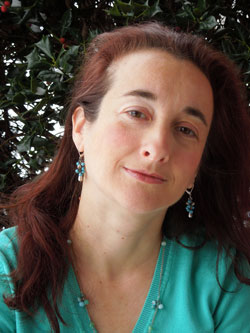
Tell me about yourself. Where did you grow up?
I grew up in an industrial town in communist Romania of the '70s and '80s. My father was a chemical engineer
and my mother taught middle school Romanian and French.
Things got progressively worse in the '80s when the food and basic supplies penuria reached its heights.
Everything was rationed: bread, sugar, cooking oil, gas. The stores were empty and there were huge lines
for everything useful, not only food. We had hot water only on weekends for a couple of hours, and only
two hours of state-controlled TV each day. These things show up sometimes in my poems because they were
part of daily life.
But I had a normal childhood, pretty uneventful. I played the violin. My parents did a good job sheltering
me from everything. And you get used to not having certain things, like bananas, or cartoons.
It's surprising how well humans adapt. In high school, I started to listen to Radio Free Europe,
mostly because of their rock music hour. It was of course illegal, but everyone was doing it.
There wasn't much TV to watch, so I turned to books instead. I was always bookish and shy, so I read a lot.
In the '80s, there weren't many new translations being made because of the censorship, but the classics were
available. So I spent a lot of time reading.
Then, in 1989, the revolution happened, and the whole communist structure went bust. For the first time,
there was freedom, freedom to travel, to do anything. We didn't really know what to do with that much
freedom, except to emigrate.
You immigrated to the USA in 1995. What was this experience like for you? How did you adjust to life here?
At the insistence of a close friend, I applied to the visa lottery. It's a program of the State Department
called "Diversity Visa," through which a certain number of green cards are awarded to immigrants from different
countries. The computer drew my application number. Ironically, my good friend who suggested to emigrate
together didn't get the visa.
I flew directly to New York in June 1995, by myself, because I knew English and I could potentially get a
job. I was 26, and terrified. First time on my own, and in NY, no less (my husband, who didn't know a word
of English, followed shortly, in July.) Getting used to the new life at the New York pace was one of the
hardest things I did. I had no friends, no family, no clue. I knew English, but everyone talked so fast!
I couldn't keep up translating in my head. But I was lucky enough to land a hostess job in a restaurant
two weeks after my arrival. I seated tons of people and smiled a lot. The rest, as they say, it's history.
When did you start writing poetry?
I started by writing prose first, not poetry. I think I was in 6th or 7th grade. I wrote sci-fi novels about
kids my age who had adventures in space. Talk about escapism, heh?
Poetry came a bit later, in high school. I wrote through my first 3 years of college but published
very little. After the regime change in 1989, I went on a long hiatus. Life got in the way.
Everything was changing very fast, and continued to change when I emigrated and started over.
It wasn't until 2002 that I started writing poetry again in Romanian, on and off. I kept a journal.
I switched to English in 2004. I published one or two poems per year, and never thought poetry was
really possible until 2007 when I joined The Red Wheelbarrow Poets. It's because of the group and
our weekly meetings that I can say I'm writing today.
Where is your favorite place to write?
I don't have a favorite place to write. I don't sit in a favorite chair, or gaze out the window, etc. Ok,
some gazing is involved, because I write on the bus on my daily commute between New Jersey and New York.
It's hardly my favorite, but I can credit New Jersey Transit with giving me enough commuting time and a
seat so I can jot down my poems. I revise on the laptop at my dining room table, usually late at night.
Talk about your books: "Angels & Beasts," "The System," "Eternity's Orthography," and the anthology of
contemporary Romanian poetry "The Vanishing Point That Whistles."

I'll start in chronological order. "Eternity's Orthography" is my first chapbook, some of the first poems
I wrote in English. Very delicate and nostalgic poems about the Romanian countryside and its people. It was
published in 2007 by Finishing Line Press.
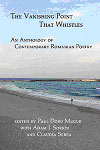
In 2007, I started to work on translations of contemporary Romanian poetry. My own poems were getting rejected
a lot, and some editors asked me to submit translations instead. That's how I started. Romanian poetry is very
strong, beautiful work that always inspires me and gives me courage. It deserves to be known better. I met
Paul Doru Mugur and Adam Sorkin who had a lot of editorial and translation experience, and we worked together
for the next 3 years. "The Vanishing Point That Whistles" was published in 2011 by Talisman House Publishers.
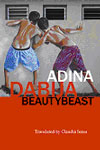
At the same time, I discovered Adina Dabija's poems and translated those as well. We became friends quickly-she
lives in New York. Her style is different from mine, much more playful, irreverent, but serious at the same time.
"Beautybeast" was published in 2012 by North Shore Press, Alaska.
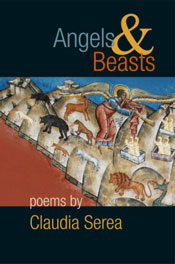
But I continued writing my own poems as well. My style evolved, and, by 2010, I discovered the prose poem as a new,
interesting form. I love the freedom of the prose poem: you can be as crazy as you want-in fact, the crazier,
the better. I started to write short surreal paragraphs inspired by my daughter's nightmares, dreams, old folk
tales and Romanian myths, pieces of news, and fragments of the "only in New York" kind. This is how
"Angels & Beasts" was born, my collection of prose poems published in 2012 by Phoenicia Publishing in
Montreal, Canada.
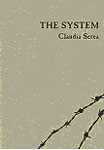
"The System," my latest chapbook, is a different story. I have to give you a few details first: I am the
daughter and granddaughter of former political prisoners in Romania. In 1958, a huge wave of violence swept
the country in the push of the communist regime to complete the nationalization of the land. Everyone who
didn't want to give away their little parcel of land, horse, or tractor to the collective was accused of
"conspiracy against social order," sent to a masquerade trial, then off to prison or forced labor camps.
Tens of thousands of peasants were arrested. Among them, my grandfather and his two sons, my father and
my uncle. My grandfather was sentenced to 25 years of hard prison. My father was 18 at the time of his
arrest. He was sentenced to 8 years. My uncle was arrested earlier in connection with the Hungary
uprising and sentenced to 10 years.
In "The System," I go back to the minimalistic style of my first collection, only the topic is much
more somber. This small book is my attempt to dismantle and look at the individual parts that make a
repression system, and how all the parts work together to crush the victim. I follow my father through
all the steps, from the informant's report to the secret police, to the arrest, interrogation, trial,
sentencing, the prison, the guards, the labor camp, and finally the release from prison into the larger
prison of the country. The chapbook ends with an informant again because my father was followed by the
secret police after his release from prison as well.
Talk about your book just released in December 2013. What is the name of the book?

My latest collection is called "A Dirt Road Hangs From the Sky," published by another Canadian press,
8th House Publishing. This book is the full-length volume building on "The System." The focus here is
not the repression system itself, but the suffering of the victims. It occurred to me that when all
these events happened, my grandmother was in her 40s, just like me now. In one year, she
lost everything: her husband and her sons, whom she didn't know if she'd see them alive
again; she was evicted from her house and all her possessions were confiscated. She was
left without any means of subsistence. I wondered how she must have felt. She must have
cried a lot-but she was a deeply religious woman, and she survived. This book is about
her and about the countless other victims who didn't protest or were silenced. It's a
book about memory, pain, and ultimately about surviving. Here is a short poem from the
beginning of the book:
Words around my neck
Tell me, grandma, everything you know,
so I can be your mouth when you're gone.
I'll be one with you.
Your brown eyes will be mine,
your hair, your nails, your breath,
all mine.
I'll wear your words around my neck
on a silver chain with a filigree heart.
I'll keep the necklace
on the table next to me at night,
next to the stained mirror
that has seen it all.
The chain will give a faint glint
and start speaking
when the moon will muster
enough courage to stand witness.
You also have a book coming out next year by Červená Barva Press. Talk about that book as well.
"To Part Is to Die a Little," forthcoming from Červená Barva Press, is a book about my immigration journey.
These are poems very dear to me about my decision to leave Romania and my first impressions from New York where
I worked in a restaurant; poems about memories, old and new friends, about carving a new life and meeting
people from all over the world. There are poems of longing for home before I knew my home was here. Poems
about the loneliness of the immigrant in New York. For years, I asked myself if my decision was good or not.
I still feel sometimes that I live two lives at the same time, one here and one there.
Who are some of your favorite writers and why? Which writers are so inspirational to you
that you read them over and over?
Oh, I have many favorites, but I'll name just a few. They are writers who just speak to me, there's
no other way to describe it. Writers from which I learn and who make me want to write better. From
the Romanian poets, certainly Mircea Cartarescu, Ioan Es. Pop, Cristian Popescu, among many other
crazy good young poets that I admire. On the American side, my biggest discovery was Charles Simic.
I just love him-and there is nothing better than "The World Never Ends." Also, Anne Sexton, Sylvia Plath,
James Wright, Stanley Kunitz, William Carlos Williams, Peter Balakian. I always go back to them;
I have a stack on my nightstand.
And I can't forget some other international names: Anna Akhmatova, of course, and also
Tomas Tranströmer, Federico Garcia Lorca ("Poet In New York" was a revelation), Rilke,
Neruda (especially "The Book of Questions" and "22 Love Songs.") I have to add some novelists
as well: Mircea Eliade, Gabriel Garcia Marquez, Mario Vargas Llosa, Milan Kundera, Vladimir Nabokov,
Herta Muller. I could go on and on, really, but I'll stop here.
Any last words?
Keep writing, dear friends. Never give up. Persistence is the most important quality.


If you would like to be added to my monthly e-mail newsletter, which gives information on readings,
book signings, contests, workshops, and other related topics...
To subscribe to the newsletter send an email to:
newsletter@cervenabarvapress.com
with "newsletter" or "subscribe" in the subject line.
To unsubscribe from the newsletter send an email to:
unsubscribenewsletter@cervenabarvapress.com
with "unsubscribe" in the subject line.

Index |
Bookstore |
Image Gallery |
Submissions |
Newsletter |
Readings |
Interviews |
Book Reviews |
Workshops |
Fundraising |
Contact |
Links
Copyright © 2005-2013 ČERVENÁ BARVA PRESS - All
Rights Reserved
|

